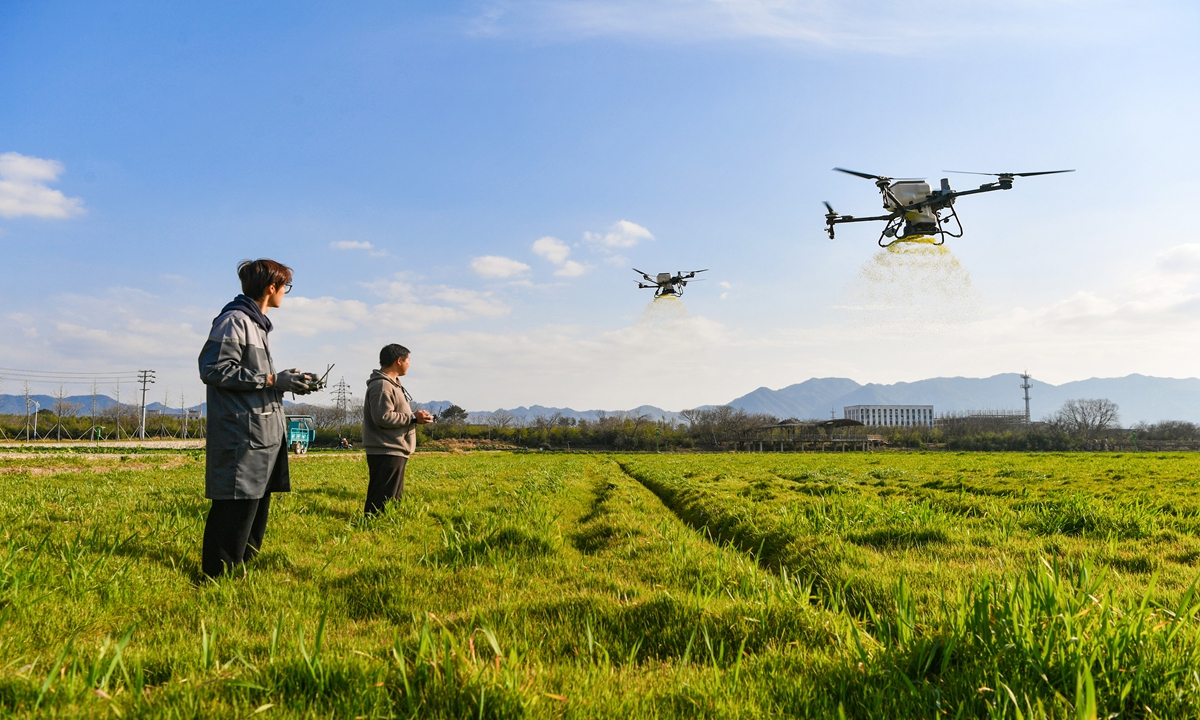
Tech-savvy farmer pilots maneuver crop-dusting drones over wheat fields in Jinhua, East China's Zhejiang Province, delivering precision fertilization during the pivotal spring jointing phase. File photo: VCG
China unveiled a 10-year master plan for agricultural development on Monday, outlining key objectives to guarantee national food security, systematically boost agricultural productivity and substantially increase farmers' incomes, by leveraging reform, opening-up and technological innovation as primary drivers.
The plan, jointly issued by the General Office of the Communist Party of China Central Committee and the State Council, outlines action targets, including achieving an overall annual grain production capacity of 1.4 trillion jin (700 million tons) and maintaining a reasonable level of self-sufficiency in important agricultural products by 2027.
By 2035, the plan envisions decisive progress in all-round rural revitalization, the basic realization of agricultural modernization, and the establishment of modern standards of living in rural areas.
By the middle of this century, rural areas will be fully revitalized and agriculture and rural modernization fully realized, according to the plan.
Apart from the long-term goals, the plan specified seven core objectives to transform China's farming sector, including firmly securing the Chinese people's food supply through comprehensive grain production capacity building, achieving full self-reliance in high-end agri-tech via nationwide equipment innovation and promoting urban-rural integration.
China will also improve foreign investment access in the agriculture sector as one of the efforts to expand international cooperation, according to the plan.
Analysts pointed out that the priority of this master plan is to ensure the country's self-sufficiency in food supply.
China will prioritize yield gains of staple crops and improve the quality of rice and wheat. It will also make efforts to unlock the production potential of rapeseed, peanuts and other oil crops, while diversifying oil sources such as tea-oil camellia and animal fats, read the agricultural modernization plan.
In terms of the upgrades in livestock and vegetable supply chains, the plan outlines that China will boost vegetable production in cooler climate zones, promote high-quality swine industry development, enhance dairy sector competitiveness, improve the productivity and quality of the beef, cattle, mutton and sheep industries, and modernize fisheries.
According to the plan, China will adopt a comprehensive, multi-channel approach to develop and diversify food resources, including eco-friendly aquaculture expansion, construction of land-based and deep-sea aquaculture farms, regulated marine fishing, and biotech-driven solutions such as edible fungi production and synthetic biology industrialization.
China vows to secure the nation's food supply through the enhanced construction of a diversified food supply system, as well as support provided to the steady development of animal husbandry, further enhancing food security, Wang Gangyi, a professor at Northeast Agricultural University, told the Global Times.
"It means that a required stable level of production is not limited to grain products, but is broadened to include meat, eggs, milk and other agricultural byproducts," said Wang.
As seeds are considered the "chips" of agriculture, the master plan also underscored the importance of revitalizing the seed industry, Wang pointed out.
According to the plan, China will accelerate efforts to achieve technological independence in seed development and secure control over key genetic resources.
Measures included launching joint breeding research programs and livestock genetic improvement initiatives, implementing a major biological breeding project to develop high-yield soybean varieties with elevated oil content and salt-tolerant crops, and fast-tracking the commercialization of bioengineered seeds.
Wang pointed out that the plan divided ensuring food security into several key dimensions such as production, pricing and trade, as well as disaster prevention and mitigation, rural construction, increasing farmers' incomes and rural governance.
China's latest agricultural modernization plan also calls for a full-scale upgrade of farm machinery nationwide, with a focus on accelerating research and development and the application of high-end intelligent agricultural machinery and boosting domestic production of key machinery parts.
China will promote the scrapping and upgrading of old agricultural machinery and optimize the structure of agricultural machinery and equipment, according to the plan.
The upgrades of agricultural equipment are in line with the country's efforts in industrial upgrading, under which, according to an action plan released in March, China aims to increase its investment in equipment for industry, agriculture, construction, transportation, education, culture, tourism and medical care by at least 25 percent by 2027, compared with 2023.
Agricultural machinery upgrading will support the construction of high-standard farmland, which has been proven to be a crucial measure to ensure national food security, while creating conditions for the application of smart and digital farming technology, Li Guoxiang, a research fellow at the Rural Development Institute of the Chinese Academy of Social Sciences, told the Global Times.
China is pushing for the integration of digital technologies with modern agriculture, a goal that was also included in the master plan released on Monday.
The agricultural application of advanced technologies such as 5G, the Internet of Things, artificial intelligence (AI) and big data is transforming the industry.
At a factory in Zigui county, Central China's Hubei Province, robotic arms and AI-empowered electronic recognition systems are being used to handle, clean, screen and sort navel oranges. The smart system is quick enough to sort about 600 oranges per minute, while determining the sugar and water content of the oranges, the factory owner told the Global Times.




